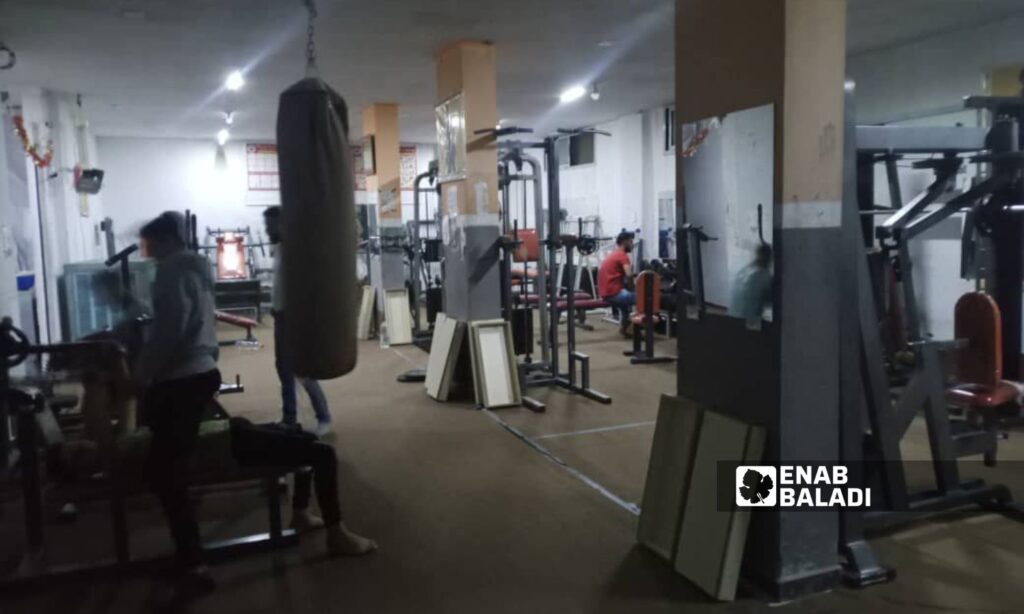Daraa – Halim Muhammad
Bodybuilding has declined in the rural areas of Daraa province in southern Syria from the preferred list of sports for the province’s youth in recent years, leading to the closure of gyms due to damages suffered by their owners.
According to trainers in the area, the demand has decreased compared to before 2018 when clubs were densely distributed in the region before the regime took control in July of the same year.
The reasons for this decline are attributed to youth migration, security chaos involving kidnappings, assassinations, and thefts, unemployment, and the weak purchasing power of the residents, according to local trainers.
Reasons for avoidance
Samer (40 years old), who owns a bodybuilding gym in eastern rural Daraa, told Enab Baladi that the weak turnout is linked to the sport being considered luxury and secondary or recreational for the region’s youth.
The demand for bodybuilding declined after prices increased and income decreased, amid widespread unemployment in the province.
Samer noticed a gradual decline in registration at his gym during the years following the regime’s control of the province, noting that registration rates vary between winter and summer seasons, improving slightly in the summer, according to coach Samer.
He added that the region lacks young people after the waves of migration that Daraa province witnessed, as many of his customers migrated outside Syria.
Samer charges monthly fees of up to five dollars per subscriber, and he spends most of his income on operating costs for his gym, including electricity generators.
The price of one liter of diesel is 18,000 Syrian pounds (about 1.2 US dollars).
Samer also incurs additional amounts in periodic maintenance of sports equipment, as he cannot risk any of them breaking down, especially since their price is high, according to him.
Psychological and social motives
Mohammad al-Mefaalani, a resident of Nahteh town in eastern rural Daraa, canceled his gym membership in June 2018, considering that continuing became exhausting for him, especially since there is no gym in his town, so he had to resort to a gym in a nearby village.
He told Enab Baladi that after the security concerns that overshadowed the scene in Daraa following the regime forces’ takeover, he no longer cared to practice the sport he had loved since childhood, according to his expression.
He added, “I no longer have a goal, and the desire to build an ideal body has died.”
According to the young man, regularly attending the gym is risky in terms of security, with the possibility of being kidnapped or assassinated during his frequent visits to the gym.
Daraa province is experiencing a state of security chaos involving murders and kidnappings, and human rights offices document dozens of assassination cases monthly in the southern province.
Al-Mefaalani also said that the region has become devoid of the young generation after “large numbers” of them migrated, and this group is the main operator of sports clubs.
Financial cost
The number of gyms in Daraa province has declined. While each city like Dael, Tafas, and al-Harak had no fewer than four gyms before July 2018, the number has decreased to one gym, and there are no gyms available in most small villages and towns.
Omar (25 years old), a resident of Tel Shihab town in western rural Daraa, said that his reluctance to go to any gym is due to the lack of one near his residence.
He told Enab Baladi that he needs one liter of gasoline for a round trip on his motorcycle if he decides to register at a gym in Tafas city.
The price of one liter of gasoline has reached 30,000 Syrian pounds, meaning he needs about 900,000 Syrian pounds monthly if he trains daily, which is ten times the registration fees at the gym.
Omar, a university student, added that there are priorities that push him to avoid practicing sports, which is his work in agriculture as a daily wage laborer with a wage not exceeding 30,000 pounds to cover his educational expenses.
Meanwhile, Omar relied on morning exercises at home, fearing weight gain.
He said that training in the gym is more enjoyable, and there are machines that make the athlete eager to continue performing a sport supervised by a specialist who also sets a scheduled diet program.
About 80% of the Syrian population in 2024 needs some form of humanitarian assistance, according to statistics released on February 12 by the World Food Programme (WFP).
About 55% of Syria’s population suffers from food insecurity, with 3.1 million of them suffering from severe food insecurity.

